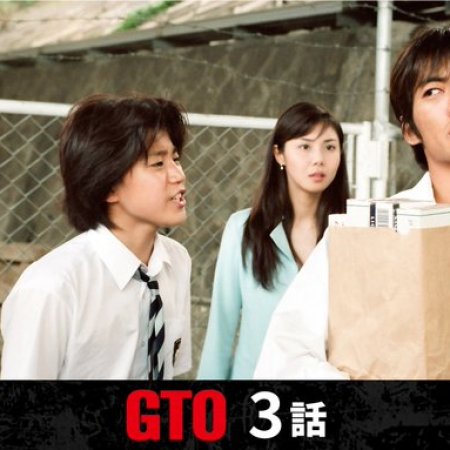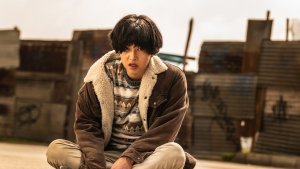GTO Episode 3 Reacţii

Due to the particular theme in this episode - bullying - this amazing episode touches on so many relevant topics that Japan faces in both schools and workplace. This is undeniably GTO's best episode so far.
Beginning from last episode's cliffhanger, we immediately touch on the sensitive subject of teen suicide and bullying in school. Like many issues in Japan, School bullying has always been an unresolved problem. Unfortunately, Japan as a culture prides itself in the status quo, so many problems like women's rights and bullying went on unsolved, and all people could hope for is the many J-drama that touch on these issues (particularly the latter) over and over again. Bullying has always been existent in Japanese high school drama and anime, so it was inevitable that a show about high school like GTO would touch on this. Episode 3 in particular offers a more idealistic but hopeful approach to how it might be resolved. It might be unrealistic, but it certainly warms one's heart and has the potential to spur people into taking action against these problems.
And the great thing about this episode is that it doesn't just touch on bullying at school - that's a common theme we've seen in many teen drama - but also touches on bullying at the workplace, particularly how women are bullied by men with greater power. In the case of this episode, it's Azusa Fuyutsuki being ordered around by her male co-workers as if she's the local waitress or secretary. While it's largely played off as comedic, there's a very clear emphasis on Azusa's inability to speak up for herself against such bullying by other men, and that's something very relatable not just in Japan, but all around the world.
The highlight of this episode is the introverted bully victim, Noboru Yoshikawa (Shun Oguri), and also another bully victim in the workplace, an elderly teacher teaching literature for Class 2-4. Being a bully victim myself, I sympathize greatly with both of them, and just about everything portrayed here about their bullying circumstances is accurate, especially their inability to speak out against his bullies. This is doubly true in Japan, where Japanese are expected to adhere to the status quo, to care more for the collective at large than individualism, and therefore, to not do anything that might bring problems to others - including ruining someone's reputation. Thus, it can be difficult for the Japanese people to speak out against injustice, and bully victims suffer all the more for it.
Despite the heavy subject, the overall tone of the episode is still largely comedic and light-hearted. There's more banter between Onizuka and Azusa as the former coax the latter into speaking out against her co-workers (to no avail), to which she replied aptly, "You have no idea what a woman has to go through in the workplace." There was a fun bonding session where Onizuka shares ghost stories with his newfound student allies, including Noboru and the literature teach; the former even surpassed Onizuka in telling a scarier ghost story. Regarding Noboru's casting, once again, I'm glad they didn't just pick someone weak-looking and adhere to the stereotype. Instead, Oguri here had an innocent and boyish face, but still looked like he could defend himself if only he had the courage for it.
And something great I noticed amidst all these comedic moments is that, even though the show still tries to portray Onizuka accurately in his lewdness and perverse nature, it's not the main focus of the show and it merely feels like background dressing. I'm glad it's that way, that it's more strongly focused on the students' problems and the overall drama, but I'm sure many fans of the manga would be rather bothered by this.
The best part of the episode is definitely the ending. In spite of its idealism (which someone might even label as "shallow"), I feel that it's more inspiring than it is shallow. They didn't push it so much that the victims who stand up ended up being unbelievably courageous. Instead, there's a particularly realistic and heartbreaking moment at the end that hits just a bit too close to home that made it hard to watch, when evidence of the bullying was shown. It didn't say anything about how the bullying is magically solved because of their actions, so I wouldn't necessarily call the writers naive or shallow for it.
Being a formulaic and episodic series, the episode ends with yet another cliffhanger of sorts, this time not as shocking or disturbing. I feel like I'd be expecting these cliffs from now on though if they keep doing this. :P
Trending Articles
Gangnam B-Side's Ji Chang Wook reacts to being called the 'Son of Disney+'
Read Ji Chang Wook's interview for his Disney+ series Gangnam B-Side, where he shares his thoughts on the K-drama, his experience and more
Cupid’s Dream Pairings
Join us for an article filled with drama pairings that we hope may come true one day.
A New Wave of Talent: Discovering the Rising Stars of South Korea
Our article series continues with a spotlight on rising Korean actors!
Family by Choice's Hwang In Youp reveals his secret to looking young at 33
Hwang In Youp spills the beans on his age-defying looks at the interview for Family by Choice
When the Phone Rings starring Yoo Yeon Seok and Chae Soo Bin postponed twice in December
When the Phone Rings will be canceled twice in December.
Kim Mu Yeol replaces Kim Nam Gil in the upcoming controversial K-drama Get Schooled
Kim Mu Yeol will replace Kim Nam Gil as the main lead of the webtoon-based K-drama Get Schooled.
The Queen Who Crowns rated 19+ on TVING and 15+ on tvN
The historical drama The Queen Who Crowns, led by Cha Joo Young, to be released in two versions
Bai Lu and Wang Xing Yue's first look from their upcoming Chinese historical drama unveiled
Take a look at Bai Lu and Wang Xing Yue's transformation into historical officials in the Tang dynasty
Song Joong Ki goes to Colombia hoping for a better future in Bogota: City of the Lost
Check out the stills from Bogota: City of the Lost featuring the one-and-only Song Joong Ki
Zhao Lu Si on how she is similar to Duanwu – The Story of Pearl Girl
Read Zhao Lu Si's thoughts on Duanwu's growth, struggles, and the similarities she shares with her. The actress also opens up about her responsibilities as a world-famous Chinese actress

















